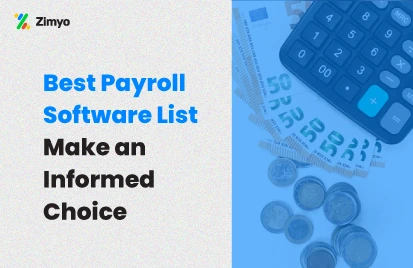Paying employees on time is crucial. Untimely or incorrect payments can hamper employee motivation and make them lose trust in their organisation.
As an HR manager, you carry the vital responsibility of making sure everyone is paid on time and correctly. A single mistake can put employee’s trust and the company’s reputation at stake. Payroll processing, therefore, is an essential task and one that needs to be done correctly.
Payroll process is considered a confusing and tedious task. There are high chances that errors can quickly occur while processing the payroll. There is also a possibility of some errors going unnoticed. HR teams must ensure that they maintain an accurate payroll cycle, not just from a compliance perspective, but also as a crucial way to keep employees engaged.
What is Payroll Processing?
Payroll processing implements an employee’s pay based on his salary, deductions, and wages. It also involves filing reports and paying employment taxes to HMRC.
These calculations must be done in enough time to follow the company’s pay schedule and comply with applicable rules and regulations.
Payroll processing has come a long way. Generally, any payroll cycle comprises primary layers: processing, input, and output. There are significant advancements made in the output and processing layers; the input layer is still handled rudimentarily. Whether you are managing payroll in-house or via payroll providers, even the minor data can ruin your entire payroll process and put your credibility at risk.
Tips to Make Payroll Processing Efficient
To make sure that payroll processing is not ignored, here are things that HR managers must do to make sure these calculations are accurate.
-Classify workers
It would help if you accurately classify your workers as either independent contractors or employees. This classification is not arbitrary and is highly crucial. You need to accumulate and pay taxes, pay overtime wages, and follow minimum wage laws with employees. These things are not mandatory for independent contractors.
If you classify a worker inaccurately, you could owe taxes and back wages, interest, and penalties. It would help if you had employees in the payroll system. Independent contractors shouldn’t be on the payroll.
– Automate payroll
Using a manual payroll system can result in a lot of mistakes. You may insert a wrong number into the calculator and forget to include something or record a number in the payroll process’s wrong spot. Or get lost in an unlimited number of excel sheets.
Automating payroll deducts the chances of errors drastically. To implement an automated payroll process, you can use online payroll software. The software will calculate pay and taxes. The software will be accurate, so you won’t have to worry about wrong information or errors.
– Be transparent
Employee’s frustrations with payroll can affect their morale. Whether it is a pay check that sends home less money than expected, misclassification of an employee’s performance or other such issues will not sit well with your employees.
Implement a payroll policy that lays out employee classifications, how the payroll process works, how payroll blunders are corrected, and other matters that employees should understand. Insert the information in the employee handbook or manual, so it’s standard across the company.
Creating a secure online portal where workers can access the information about their withholdings, pay checks, benefits, and more goes a long way to convince employees about their pay. It is also a good idea to have FAQs answered to help themselves with timely information.
– Make reports on time
Each month, you must pay HMRC the tax and National Insurance you owe as reports on the FPS in the previous tax month minus the deduction on any EPS (Employer Payment Summary) you sent before the 19th in the tax month.
HMRC will send you a late filing notice if you have paid any employees and do not send an FPS or delay one. You may also have to pay the penalty unless you have a valid reason for reporting late. Missing, late, or incorrect payroll reports can affect the employees’ Universal Credit Payments. Keep a schedule of important payroll dates, including bank holidays that affect closings.
– Simplify
Other than the potential for mistakes and backed-up workflow, another essential thing to consider in payroll efficiency is the management cost.
Internal management costs include software updates, training, and the penalties and fines that occur from mistakes. Analyse efficiencies to ensure you have an accurate image of the actual costs and where savings may be realised.
When internal management manages payroll, the time-intensive work takes time away from each aspect of running a business. The time consumption grows as the business expands and adds more employees, but even a company with just an employee may be better off outsourcing payroll.
– Track
It would be best if you accurately track how much time the employee works. It will be helpful for employees working on hourly wages and employees who are eligible for overtime wages. You need a method to track attendance and time. Online software is an excellent option because employees can log in to their accounts and log their end and start times. Because it’s online, employees working from their homes due to the pandemic can also use the software. Attendance and time software can also help you avoid time theft, and you can review the reports before you run payroll to ensure that they are accurate. You can compare them to work agreements and schedules to verify their validity.
– Conduct payroll audits
Conduct regular payroll audits to ensure that the information is accurate. You can conduct a payroll audit on a quarterly or annual basis.
When performing payroll audits, ensure that the payroll information is correct. Essentially, you will ensure that the numbers add up and go to the right person.
Check employee wages. Make sure to calculate them correctly, verify that all deductions are withheld at the right time. Check that you calculated the employee’s taxes accurately.
Also, check that taxes and other subtractions are paid to the appropriate parties.
– Keep up with updates
Payroll keeps changing. Governments are frequently passing new laws, and because of the pandemic, there are frequent law changes. Tax rates and minimum wages often vary once a year. It is better to dedicate some time to learn the updates.
You can get the information from various sources. Check news sources that report on payroll-related changes. You can subscribe to newsletters from government sources and niche blogs. Ensure to check your mail for rate notices from your local and state governments. Gather information from local business companies.
Keeping up with the updates may be time-consuming, but it’s worth it as it can save your money and time in the long run by avoiding errors.
If you have payroll software, the provider usually updates the software whenever there are changes to standardised tax rates. But it is still better for you to keep up with laws and individual business rates.
– Keep records
HMRC can check the files at any given time. Your policies should be clear and documented so anyone can follow them,
– Complete annual reports
You must report to HMRC on the previous tax year and prepare for the new year. You must include your employees’ payroll deductions and benefits in an FPS.
You will have to update employee payroll records from the last tax year’s previous date to prepare for the next tax year. Provide your employees with a P6O, and report employee expenses and benefits.
The payroll system should help you stay ahead of changes and accommodate rapid expansion. Question yourself, can the business cope with hiring more employees? Will the extra admin be too much of a pressure?
Cloud-based payroll systems offer real-time reporting and frequent updates to cover the latest legislation changes to cope with the changing workforce. Analyse your current loopholes and fill them up with efficient solutions.
Also Read: Payroll Checklists & Reconciliation Tools: Step-By-Step Guide To Process Payroll




